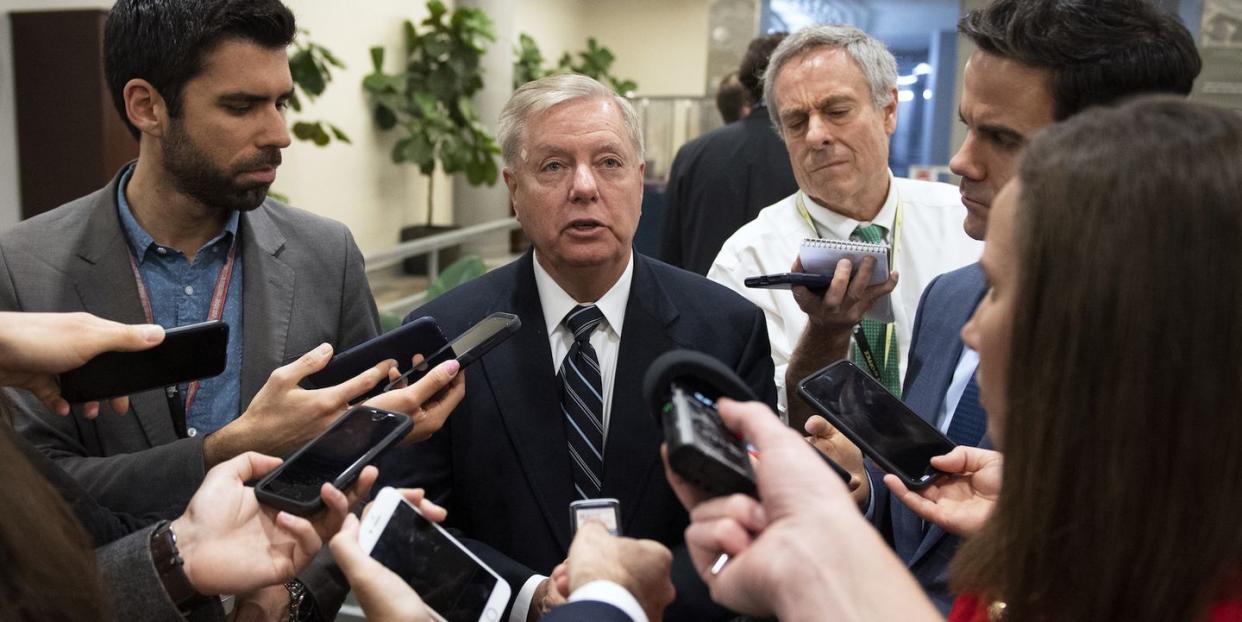Republicans Have Rolled Out at Least 22 Trump-Ukraine Defenses, Many of Which Contradict Each Other

We are headed towards that thrilling final page of the Republican Ukraine Defense Playbook: When the president does it, it's not illegal. Actually, it was smart and good.
This is not the first defense, obviously. Many of the previous defenses involved denying it happened. Republicans rejected the notion that the president extorted a foreign government in order to force them to meddle in the 2020 election for his personal political gain—an abuse of power and a betrayal of his oath of office. The Whistleblower was a shadowy, biased source providing hearsay, you see. It never happened. Then more direct witnesses came forward, on the record, to confirm The Whistleblower's account—at which point they were attacked as NeverTrump Deep State bureaucrats. One consistent theme, however, is that the impeachment witnesses are speaking under oath, under penalty of perjury. The president and his defenders are not.
It will make no difference that this inevitable last defense contradicts many of the previous. Many of the previous contradicted each other, too. In fact, as the Washington Post illustrated in a brilliant video posted Monday night, the Republicans have rolled out at least 22 different defenses for Trump's actions with respect to Ukraine. No consistency of fact or logic is required here—you just need to protect Dear Leader at all costs. You can contradict yourself from one day to the next, so long as Fox News never points out the discrepancies, which they won't.
Republicans have floated 22 different defenses of Trump's Ukraine actionshttps://t.co/K5lSJYUlfx pic.twitter.com/nvOhsuc8KH
— The Fix (@thefix) November 19, 2019
Trump's defenders attacked The Whistleblower; then they said there was "no quid pro quo"; then they attacked The Process; then they said Trump didn't know what he was doing; then they said he failed in his extortion attempt, so it's all good; then they said Ukraine's president—still completely beholden to the U.S. for aid to fend off Russian aggression–said there was no extortion; then they said there were "differences of opinion"; then they went back to "no quid pro quo"; then they tried to cast Rudy Giuliani as a rogue agent; then they tried to pass off withholding aid as normal policy in the national interest; then they said Trump was refreshingly transparent about his motives; then they said it was appropriate because he was asking them to look into generalized corruption (he wasn't); then they said it was inappropriate but not impeachable; then they said the Trumpists couldn't possibly have figured out how to do a quid pro quo; then they said it was a coup.
It happened. It didn't happen. It doesn't matter that it happened. Democrats. Whistleblower. Read the Transcript. And the best of all: What you have to understand is that Donald Trump cares deeply about corruption. Sure, that's the Trump we all know and love. Maybe that's why he tried to cut billions of dollars from a program designed to fight corruption in Ukraine and elsewhere.
It's supposed to be confusing and overwhelming and absurd. The point is not to convince a majority of Americans that what the president did was defensible. It is to wear the public down until they stop caring either way—until they drop out. It is an authoritarian approach to political rhetoric, where words are not a vehicle for persuasion, but a cudgel to be wielded against those outside The Movement. Defend the leader with a constant stream of angry nonsense until everybody gets tired of resisting and lets him run rampant. It has not worked so far—70 percent of Americans believe the president's Ukraine conduct was improper, and 51 percent want him impeached and removed from office. But the Senate is almost impervious to public opinion, and you've got to give Donald Trump, American president one thing: he is so far undefeated.
You Might Also Like

